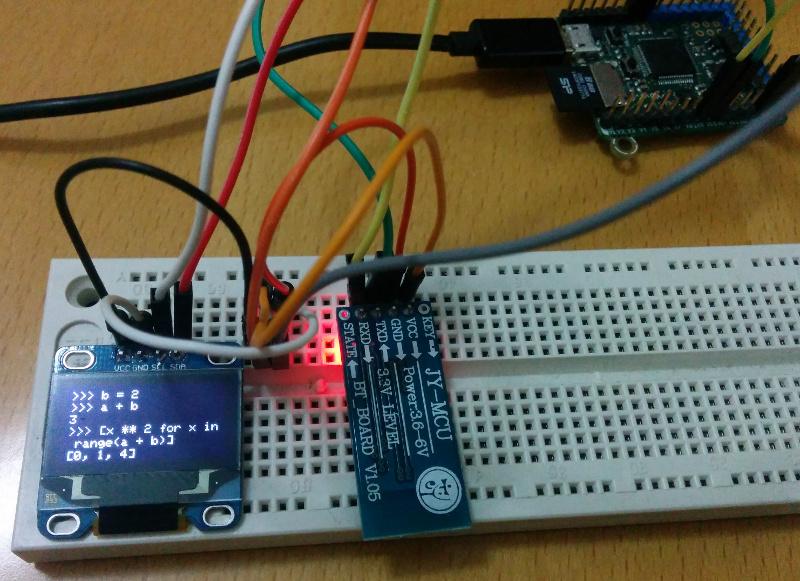All heard the stories about Smalltalk and LISP apps which worked for decades and was developed/updated via REPL (or similar), so why don’t do something similar on microcontroller board?
On pyboard we have a REPL, but we can’t run it and code on pyboard concurrently, so first of all we need to develop simple REPL with which we can do it. And for making it more interesting – make this REPL to work through bluetooth:
from pyb import UART
uart = UART(1)
uart.init(115200)
def exec_command(command):
"""Runs command and returns output for REPL."""
try:
return eval(command)
except SyntaxError:
try:
# For stuff like `a = 10`:
return exec(command)
except Exception as e:
return e
except Exception as e:
return e
def handle_repl():
"""Tries to read command from uart and exec it."""
command = uart.read().decode()
if command:
result = exec_command(command)
if result is not None:
uart.write('{}\n'.format(result))
def iteration():
"""Function for overriding."""
while True:
handle_repl()
iteration()
So now we can test it:
➜ echo "1 + 1" > /dev/rfcomm1
➜ head -n 1 /dev/rfcomm1
2
It works, so let’s try to override iteration for sending Hello World!
on each iteration to us through bluetooth:
➜ echo "globals()['iteration'] = lambda: uart.write('Hello World\n')" > /dev/rfcomm1
➜ cat /dev/rfcomm1
Hello World
Hello World
^C%
Or we can do something more practical – send measurements from accel sensors:
➜ echo "from pyb import Accel
def _send_accel():
accel = Accel()
xyz = accel.filtered_xyz()
uart.write('{}\n'.format(xyz))
globals()['iteration'] = _send_accel" > /dev/rfcomm1
➜ cat /dev/rfcomm1
(9, -6, 90)
(7, -4, 91)
(6, -5, 91)
(5, -4, 92)
^C%
That’s not all, we can also modify the way that REPL works, for example – display all REPL commands/results on little screen (ssd1306 module):
➜ echo "from ssd1306 import Display
display = Display(pinout={'sda': 'Y10',
'scl': 'Y9'},
height=64,
external_vcc=False)
orig = exec_command
def wrapper(command):
display.write('>>> {}'.format(command))
result = orig(command)
if result is not None:
display.write('{}\n'.format(result))
return result
globals()['exec_command'] = wrapper" > /dev/rfcomm1
➜ echo "a = 1" > /dev/rfcomm1
➜ echo "b = 2" > /dev/rfcomm1
➜ echo "a + b" > /dev/rfcomm1
➜ echo "[x ** 2 for x in range(a + b)]" > /dev/rfcomm1
And it works:

So it’s cool and maybe can be useful for developing/updating some hard-to-reach devices.